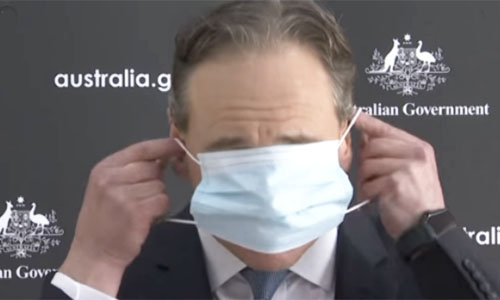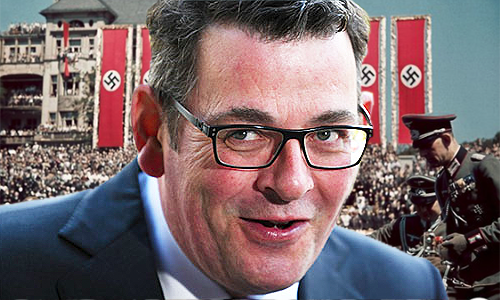
THE politicians are ruining Australia far sooner than anyone ever expected.
It was always self-evident that a lockdown of the productive sector must be a last resort. The first was completely unjustified. It has, without explanation, morphed from “flattening the curve” to preventing hospital crowding to eradication, which is impossible.
To impose this a second time over a key state is beyond the pale.
TOGETHER
If the mantra “We’re all in this together” means anything, the non-essential public sector would be locked down first and public sector wages, including politicians’, would be capped near average earnings, $80,000 pa.
The Andrews government would “do the right thing”, arrange an early election to seek an endorsement for their draconian policies. It is unacceptable that the only way they can be forced to an election is a vote of no confidence in the Legislative Assembly, unlikely without an ALP split and last seen in 1955. Until 2003, the Legislative Council could have forced an election. But having seen how effective this was with Whitlam, the major parties colluded to get rid of the power to reject supply.
While the disproportionate abuse of its powers under the Public Health and Wellbeing Act is more than likely to constitute misfeasance in public office, the Governor is most unlikely to do what Philip Game did in 1932 to Premier Jack Lang, sack the premier. A legal case would take years, with taxpayers and not politicians paying the damages bill.
SHELVED
This demonstrates an urgent need to empower the people with the right to recall politicians. Recall elections are usually triggered by a petition signed by between 10 and 40 per cent of electors. From opposition, NSW Premier Barry O’Farrell campaigned on appointing an expert panel to advise on such elections. But a subsequent favourable report was shelved, the attorney-general candidly explaining circumstances had changed – the LNP was now in government.
After well over a century, there needs to be a serious review of the constitution to restore good government across our land.
This should not be done by the usual elites, but by the people under a new version of the Corowa Plan under which federation was achieved. This would involve the election of an unpaid convention, whose recommendations could not be vetoed by the politicians but which, after wide consultation, would be put directly to the people in a series of referendums.
As to the response to the Wuhan virus, the leaders’ duty from the beginning was clear. This was to impose a rigorous control on entry, including a strong quarantine and the strongest protection of the vulnerable.
An important corollary should have been to obtain reparations from Beijing for deceitfully allowing the virus to spread throughout the world, reparations which could come from assets held by controlled corporations. But as warned here, to do this through the WHO would be a complete waste of time.
Remembering that Australia has the good fortune to be a remote island nation, controlling entry was always far simpler than for most governments.
FOREIGN
Nor was Australia, as has been claimed, the pioneer in imposing a travel ban on non-residents from China. As late as January 31, at a press conference with Minister Hunt, Chief Medical Officer Murphy spoke against a travel ban which he said was opposed by the WHO; hardly a surprise. If the situation worsened, he said naively, Beijing would “stop exits from China, which is a more effective way (than a ban)”.
But later that day, against advice and with the outrage of the Democrats and mainstream media, President Trump announced a travel ban on foreign nationals who were in China in the preceding 14 days. The next day, Australia turned tail and imposed its own ban.
Nevertheless, entry and quarantine controls were shown to be seriously inadequate during the first crucial two months and not only in relation to the Ruby Princess. Nor were the most vulnerable properly protected, as has been sadly seen in NSW and especially Victoria.
It is clear that had the leaders properly controlled entry, we would not have the serious problem we have today.
The fact is that our political leaders no longer lead. They are guided neither by common sense nor even evidence. Instead, they have not so much a blind but an insane reliance on computer projections, even when these have been shown to be constantly wrong.
We see this in relation to global warming with disastrous consequences for the cost of energy and manufacturing in Australia. The difference between the major political parties is only one of degree, the Coalition’s being very bad and Labor’s even worse. All this is despite the fact that even the government’s chief scientific expert admits that this heavy burden on Australians will have not the slightest effect on the weather.
UNELECTED
In addition to computer projections, there is an over reliance on advice from expert bureaucrats. The result is politicians no longer exercise the Burkean judgement with which they claim to be endowed, but instead defer to unelected advisors, ignoring advice from world experts.
There was a much better source of consolidated advice, simple to find, and world’s best practice. But this involved going to the source banned by the communists, democratic Taiwan. Next door to China, with a similar population to Australia she imposed the most effective entry controls and quarantine, looked after the vulnerable, had no lockdown and experienced only seven deaths. Compare that with the ruination of our economy, a massive debt burden, businesses, careers and lives ruined and with well over 300 of our most vulnerable dead.
Was world’s best practice ignored because so many elites are paid-up members of the Beijing lobby? Must Beijing always be obeyed? Is it that thus weakened, Australia is even more vulnerable to take-over?
If only Australians could recall their politicians and control their replacements. The Australian rank and file have far more common sense than them all.PC












Let me compare two leadership teams, one serious and one non-serious.
First the serious, our local church parish council. Faced with a significant increase in the cost of a proposed building project we have full and frank discussions of the risks if we proceed. We identify reduction of staff hours and sale of other income producing assets as fall-back positions should we be unable to service the debt. The discussion is minuted and each member is responsible for communicating with the parish to explain the plan.
Next the non serious, our national cabinet. Sometime in April they notice that ‘the curve’ has collapsed. Maybe they discuss this, maybe not, whatever they do they never explain to the key stakeholders (the citizens) what the risks of an eradication strategy are, they never explain what plans they have made in the case of a failure to eradicate. They never explain that there is a real chance that we will spend 100’s of billions of dollars only to find ourselves in the same or worse position we were to start with.
What are the differences between the two organisations? Our parish council has no power to compel compliance, we must convince. Our councilors are all people who work real day jobs who have daily experience of the real world where if you repeatedly make poor decisions you could lose your job or business. Our parish councilors love our church, they are not thinking primarily of how they can get elected to parish council again next year but of what is best for the church.